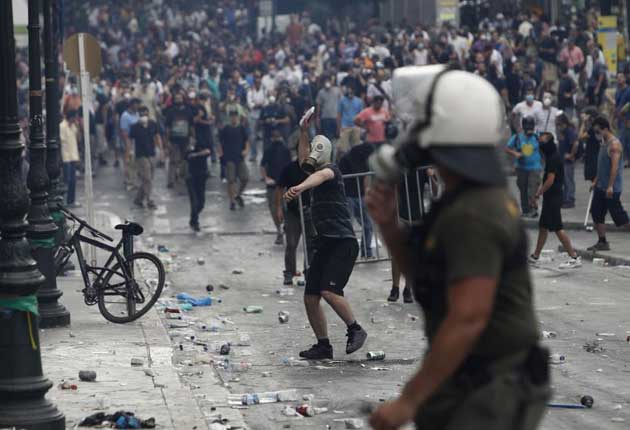Fighting outside parliament on eve of Greece's austerity vote

Your support helps us to tell the story
From reproductive rights to climate change to Big Tech, The Independent is on the ground when the story is developing. Whether it's investigating the financials of Elon Musk's pro-Trump PAC or producing our latest documentary, 'The A Word', which shines a light on the American women fighting for reproductive rights, we know how important it is to parse out the facts from the messaging.
At such a critical moment in US history, we need reporters on the ground. Your donation allows us to keep sending journalists to speak to both sides of the story.
The Independent is trusted by Americans across the entire political spectrum. And unlike many other quality news outlets, we choose not to lock Americans out of our reporting and analysis with paywalls. We believe quality journalism should be available to everyone, paid for by those who can afford it.
Your support makes all the difference.Athens was rocked by a day of street battles yesterday on the eve of a critical vote on austerity measures demanded of Greece if the country is to avoid a potential disaster.
The escalating confrontation between people and political leaders, expected to resume today, has stoked fears of a banking and eurozone crisis that some analysts are equating with a "second credit crunch".
A day that began with a peaceful show of force from Greece's unions quickly descended into running battles between masked youths and riot police outside parliament yesterday.
With much of the country at a standstill thanks to a general strike and rolling power cuts, Greek MPs will vote later today on a package of austerity measures which are seen as essential by much of the rest of Europe but are unpopular in the country itself.
The Deputy Prime Minister Theodoros Pangalos said that tanks may have to be sent into the streets to stem the chaos if the bill fails to pass and a run on Greek banks begins.
Syntagma Square, occupied by anti-austerity protesters for the last month, was yesterday carpeted with broken paving stones, smashed glass and tear-gas canisters. Amid the destruction, a young woman, who gave her name as Lisa, walked holding a placard that said: "We didn't invite you here, leave now."
Asked whether it referred to the ranks of heavily armoured police or the black-shirted hooligans with their clubs and gas masks, she said: "Both."
The protests in central Athens have reflected broader tensions over the country's response to its debt crisis with a small minority bent on violent confrontation with authority while a peaceful majority has failed to voice any clear proposals beyond furious condemnation of its political leaders.
The protesters have spurred similar demonstrations in other European countries affected by the sovereign-debt crisis. In the clouds of tear gas in Athens yesterday, families wearing stickers saying, "we don't owe, we won't sell out, we won't pay", jostled with unionists, old-school Marxists and stone-throwing rioters from far-right and anarchist groups. Pakistani immigrants ignored recent racist attacks in the capital to sell bottled water and swimming goggles to flag-waving nationalists determined not to withdraw under the hail of tear gas. On one side of the square, a burnt-out television van was daubed with the words "mass media deception", testimony to popular Greek complaints that the country is being victimised. At the Panathinaion café inside the square, the waiting staff, dressed in work uniforms with gas masks, stood guard only metres away from the fighting.
"We are standing our ground otherwise we won't have a place to come to work at tomorrow or the day after," one waitress said.
In the streets around the square, confused tourists and Special Olympics volunteers milled around fires lit by protesters to break up the acrid gas clouds. A French couple who had come "to see the change of the guard outside parliament" and had been forced to retreat, said they were otherwise enjoying their holiday.
Outside the nearby Metropolis hotel, the owner, Costas Tziatzakis, said the troubles had led to 15 cancellations this week but blamed Greeks for bringing the crisis upon themselves. He said spending cuts, tax hikes and privatisations would have to go ahead in one form or another. "They're shouting in the square but we do owe; we will sell and we will have to pay," he said. "If not now, then our children or their children will have to pay."
Greece's first experiment with austerity and bailouts has failed, most economists agree, with the country still running a primary deficit, unemployment rising, debt increasing and the economy shrinking.
But veteran observers of the Greek political scene point out that many of the reforms proposed by the European Union and International Monetary Fund (IMF) have not been implemented and that a "deep state" of tax collectors, senior civil servants and recipients of state contracts remains mostly untouched.
Markets remain largely convinced that a Greek default is inevitable. The Governor of the Bank of England, Sir Mervyn King, said that "contingency plans were necessary" as market expectations of a Greek default were running at around 80 per cent. He endorsed the view that the EU-IMF rescue packages are about buying time rather than fundamentally solving the problems facing the eurozone – which is the UK's main export market.
Meanwhile, one of Europe's most senior bankers, Josef Ackermann, the chief executive of Deutsche Bank, said that the crisis could eclipse the failure of Lehmans in 2008, raising fears of a second credit crunch and relapse into recession. He said: "If it is Greece alone, that's already big. But if other countries are drawn in through contagion, it could be bigger than Lehman."
Join our commenting forum
Join thought-provoking conversations, follow other Independent readers and see their replies
Comments